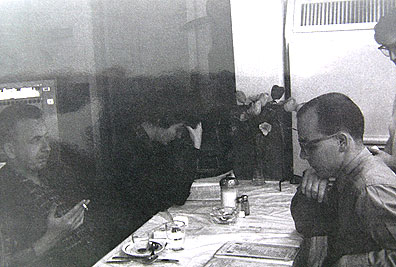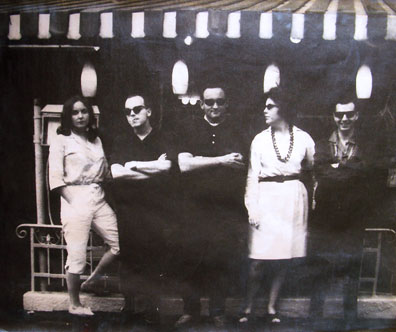The Rosemary on Metcalfe Street
by George Pandi
My Canadian life began in July, 1957, in the kitchen of the Muskoka Sanitarium outside Gravenhurst. I was a diligent immigrant, ready to learn the language, customs, social behaviour—I had trouble only with the food. The cuisine at my workplace gave me mild culture shock. No wonder; we had Ontario hospital meals by an English chef who used to cook in the army. I moved to Montreal after two months.
When I arrived, fellow Hungarians took me to a little restaurant called Rosemary. The paper place mats showed a sketch of Nelson Eddy as the Mountie and Jeanette McDonald in a cowboy hat singing in the Rockies. But the menu listed cherry soup, beef goulash, stuffed cabbage, paprika chicken, strudel—the soul food of Hungary. During lunch my friends discussed who could put me up for a few days and where I could find a job. One of them stood up and yelled into the packed room in Hungarian: “This guy needs a job!” Someone in a far corner yelled back: “Ruby Foo’s hires busboys.” The home-style food and the direct approach suited me; I joined the Rosemary regulars.

Albert Kish is on the left, George Pandi on the right.
Montreal’s famous Stanley Street had its regulars in half a dozen Hungarian cafés. At the Tokaj, dinosaurs grumbled about the Bolsheviks who nationalized their businesses. Little old ladies gossiped in the Pam-Pam. Rich entrepreneurs dipped into the Bohemian life of artistic wannabies in the Carmen. My friends and I preferred Rosemary on Metcalfe Street, away from the fashionable strip. It was cheaper and had a more multicultural crowd. The clientele consisted of a mix of occasionally employed immigrants and budget-minded McGill students—a good portion of them curious girls for whom we were opportunities for exotic adventure. How better to rebel against daddy in Westmount than to take up with someone charming but of unknown family and class. (We had better manners than Russians and Greeks who valued male bonding above being nice to women.)
I don’t know Rosemary’s previous life, hinted at by the Mountie and cowgirl on the place mats, but in the sixties it developed the spirit of Berlin, Vienna and Budapest literary coffee houses. Meaning, specifically, that you could not only linger there all day, reading newspapers and playing chess, but also consume on credit and have cashback privileges. Uncle Joe, the owner, had a wad of note papers on which he recorded the daily charge, to be paid at the end of the month. After the 59-cent lunch we marched up to the counter and announced 90 cents. Uncle Joe handed over the difference, enough for the tip and a pack of cigarettes.

Maggie MacLelland, George Pandi, George Nemethy, Joyce Lautens, John Arato. An example of the ethnics mingling with McGill library staff
It added to the ambiance when Uncle Joe shouted: “Mr. Pándi, telephone! Budapest.”
Languages mixed freely. The servers were at least trilingual (not that any knew French then). Frida from Czechoslovakia would ask: “You vant pork chop mit főzelék?” Anglophones, cautious of caffeine, learned to order “kanadai kávé” because there “coffee” meant a double espresso.
Rosemary was second home for young, single immigrants of modest means and also a point of contact between us and the mainstream culture. Guests included not only students from McGill University but europhile professors and assorted intellectuals. Bill taught philosophy, Victor was an Old Testament scholar (after work as an immigration officer), Maybin taught English, Howard was a book seller. Together we spent long hours questioning, learning history, cultural anthropology and sociology from each other. The Canadians developed a taste for Hungarian cooking and an appreciation of bilingual puns; the Hungarians learned New World mores and to read between English lines. Assimilation became easy. Several of my friends married some of those adventurous students from Westmount; I’ve been living for 32 years with a McGill librarian.
Far from stylish Stanley, this dingy, formica-tabled, fluorescent-lit little eatery lived contentedly with happy eaters and talkers until Montreal’s renaissance killed Metcalfe Street. Steel and glass boxes replaced the greystone family houses, their outside staircases and iron balconies. With them, Rosemary disappeared without a trace, without a line in the sidewalk to show where two steps led down to its covered terrace. What’s left of it are young faces remembered faintly after nearly half a century, my wife’s love of chestnut cake, and this story.
George Pandi, now 70, lives in Ottawa and writes about travel and gastronomy.
